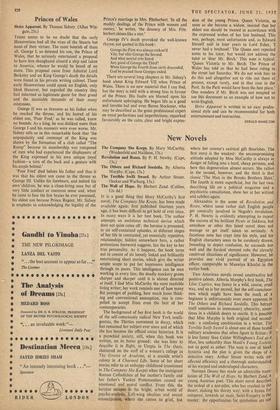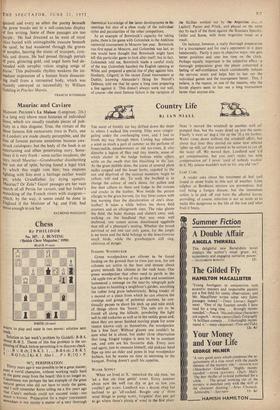New Novels
IT is a good thing that Mary McCarthy's first novel, The Company She Keeps, has been made available again; first published fourteen years ago, it has been difficult to get hold of ever since. In many ways it is her best book. The author attempts an ambitious technical device which does not quite come off : the heroine is presented, in six self-contained episodes, at different stages of her life in contrasted, yet essentially repetitive, relationships; hidden somewhere here, a rather pretentious foreword suggests, lies the key to her true personality. As it happens, the book turns out to consist of six loosely linked and brilliantly entertaining short stories, which give the writer ample scope to put her impressive intelligence through its paces. This intelligence can be seen working in every line; the deadly mockery grows sharper and sharper until it is almost directed at itself. I find Miss McCarthy the most readable living writer; her work reminds one of how many flat passages of padding, how much loose think- ing and conventional assumption, one is com- pelled to accept from even the best of her contemporaries.
The background of her first book is the world of the self-consciously radical New York intelli- gentsia, the Thirties movement in decay, which has remained her Subject ever since and of which she has become the official social historian. It is a parochial society, still, when this book was written, on its home ground: she was later to describe it in flight, to Utopia in The Oasis, cloistered on the staff of a women's college in The Groves of Academe, at a seaside artist's colony in A Charmed Life. Some of her short stories refer to an unhappy childhood (mentioned in The Company She Keeps) when the immigrant Roman Catholicism of her mother's family and her father's Yankee Protestantism caused an• emotional and moral conflict. From this, the heroine escapes tb the bright, urban world of psycho-analysis, Left-wing idealism and sexual emancipation, where she comes to grief, but where her creator's satirical gift flourishes. The first story is the weakest : the uncompromising attitude adopted by Miss McCarthy is always in danger of falling into a hard, cheap pertness, and here this degeneration almost occurs. She rallies in the second, however, and the third is that classic 'The Man in the Brooks Brothers Shirt.' The fourth is more superficial, but the last two, describing life on a political magazine and a psychiatric consultation, show her at her wittiest and subtlest again.
Alexandria is the scene of Revolution and Roses, where some rather daft English people get comically involved in Neguib's revolution. P. H. Newby is evidently attempting to repeat the success of his brilliant Picnic at Sakkara, but somehow or other this latest novel does not manage to get itself taken so seriously. A facetious note has crept into his style, and his English characters seem to be carelessly drawn. Intending to depict confusion, he succeeds too well and the farcical element robs the cleverly contrived situations of significance. However, he provides one vivid portrait of an Egyptian officer, comparable to Muawiya Khaslat in the earlier book.
Two American novels reveal unattractive but positive talents. Alberta Murphy's first book, The Lilac Caprice, was funny in a wild, coarse, cruel way, and so is her second, but the self-conscious- ness which might have been the mark of a beginner is unfortunately even more apparent in The Others and Richard Sordello. This betrays itself sometimes in unnecessary obscurity, some- times in a childish desire to startle. It is possible that Miss Murphy is both original and second- rate : a confusing combination in a writer. The Terrible Swift Sword is about one of those brutal military academies that often figure in fiction : it is less funny than Calder Willingham's End as a Man, less unhealthy than Musil's Young Torless, not so good as either. The tone is one of bleak hysteria and the plot is given the shape Of a detective story. Arthur Steuer writes with un- affected efficiency and a thorough understanding of his warped and undeveloped characters.
Norman Denny has made an admirable trans- lation of The Well of Hope, by Herbert Zand, a young Austrian poet. This short novel describes the ordeal of a test-pilot, who has crashed in tile desert, niaking his thirsty way, with a hyena for company, towards an oasis. Saint-Exupdry is the master : the opportunities for symbolism are not ignored and every so often the poetry beneath the prose breaks out in a self-conscious display of fine writing. Some of these passages are too Purple : `He had dreamed as he went of royal eities buried with unimaginable treasure beneath the sand; he had wandered through the groves of temples, hearing the music of trumpets, cym- bals and drums. He had passed through portals of pure, glittering gold, and angel hosts had de- +cended with seraphic voices singing songs of Praise.' This psalmodic rhythm weakens the im- Mediate impression of a human brain dissociat- ing itself from a tormented body, which was recently conveyed so successfully by William Golding in Pincher Marlin.
FRANCIS WYNDHAM



































 Previous page
Previous page